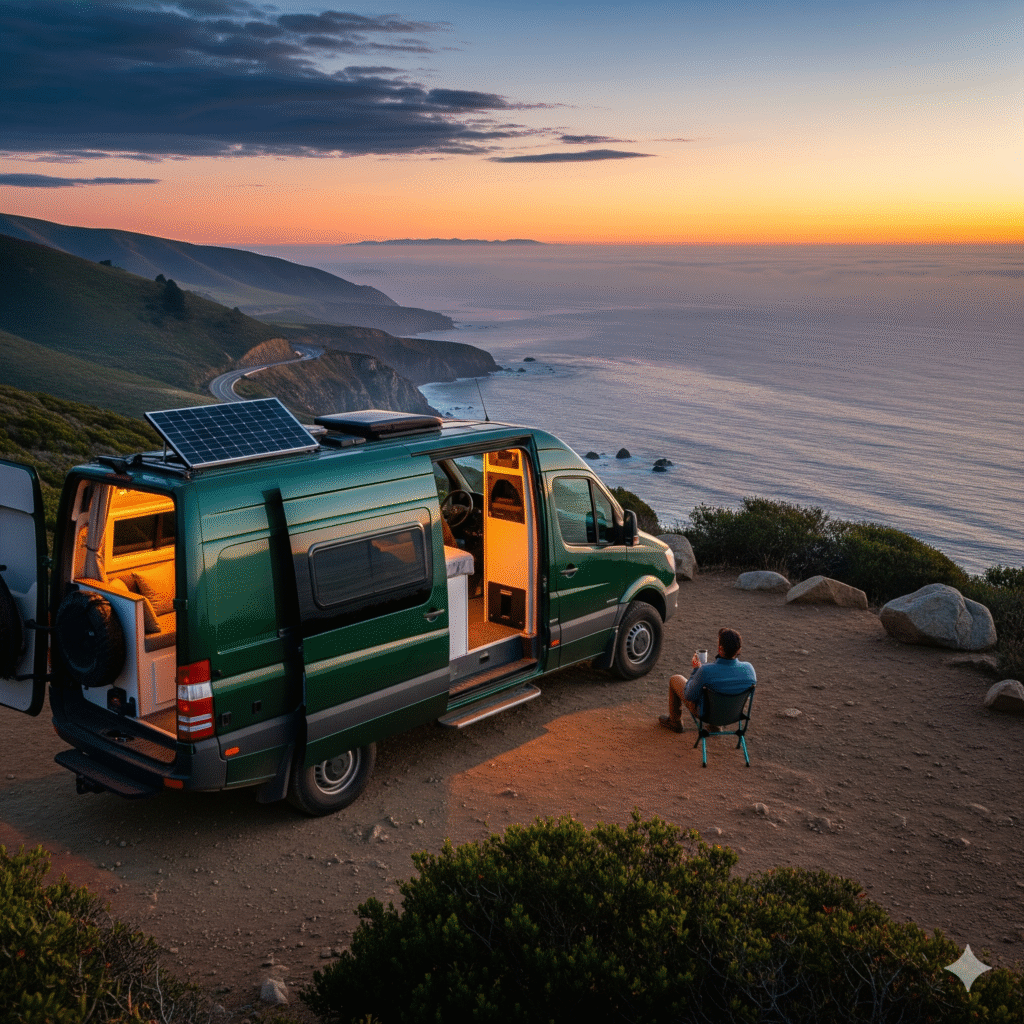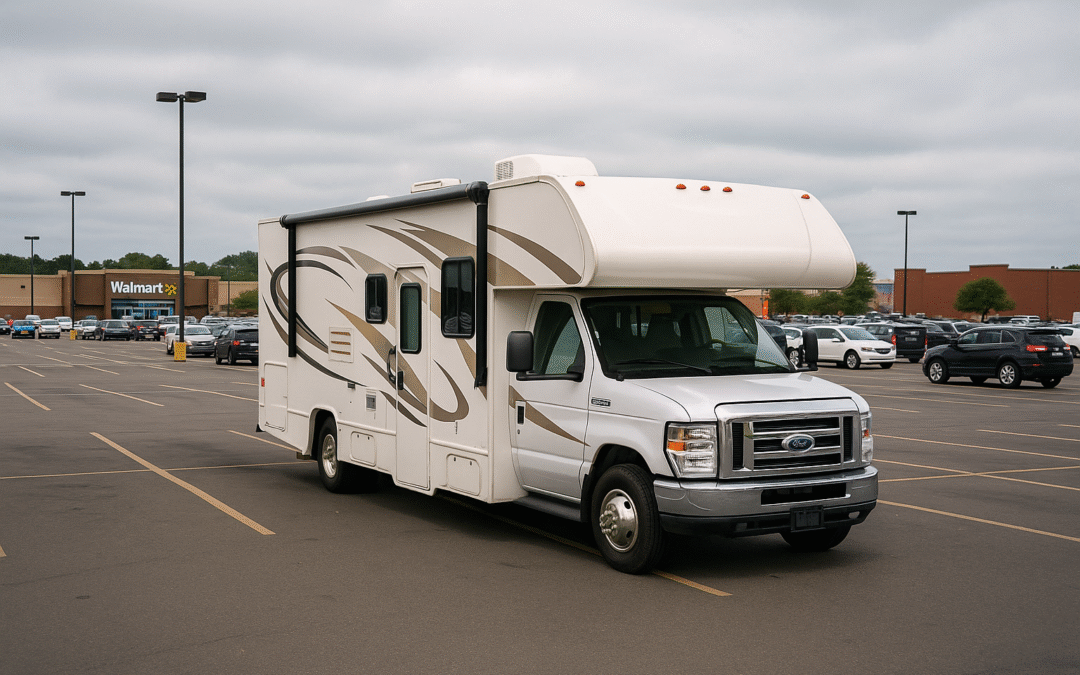Why Harvest Hosts and RV Overnights Deliver Better Value in 2025
What Does “Free” RV Parking Really Cost?
Free parking means no nightly fee, not zero expense. After tracking expenses across 3,000 nights in 44 states, we discovered that “free” Walmart spots often cost more than membership alternatives when you account for fuel, security measures, and emergency lodging.
Last July, we parked at a 24-hour Walmart in upstate New York. Trucks idled constantly just 30 feet from our slide-out. The noise measured 62 decibels on our sound meter—equivalent to having a conversation running all night. We abandoned the spot at 3 a.m. and spent $95 on emergency motel lodging.
This experience wasn’t isolated. Among the 127 experienced RVers in our network, 68% reported at least one significant issue at “free” lots, ranging from midnight relocation orders to security concerns.

Why Budget-Conscious RVers Seek Alternatives
With 9.6 million U.S. households now owning RVs—a 62% increase since 2001 according to RVIA data—demand for affordable overnight options has intensified. Traditional campgrounds charge $35-120 per night, making “free” spots initially appealing.
However, municipalities increasingly restrict overnight parking. The U.S. Department of Transportation reports that 75% of truck drivers struggle to find safe, legal parking, a problem extending to RVers as local ordinances tighten.
Our expense tracking reveals these annual hidden costs for frequent “free” parking users:
- Generator fuel and maintenance: Our Honda EU2200i burns 0.12 gallons per hour at 25% load. At $3.50 per gallon, eight overnight hours cost $3.36 in fuel alone, plus accelerated maintenance costs.
- Security investments: Motion sensors, backup cameras, and communication devices average $215 annually among our network.
- Emergency lodging: Unplanned hotel stays when “free” spots prove unsuitable average $340 yearly.
Harvest Hosts vs. RV Overnights: Updated 2025 Analysis
Both networks have expanded significantly, but serve different travel styles:
Harvest Hosts: 9,445+ locations including farms, wineries, breweries, and museums. All-Access membership costs $99 annually and focuses on destination experiences.
RV Overnights: 300+ active hosts verified as of August 2025. Annual membership costs $49.99 with lifetime pricing for early adopters and 90-day money-back guarantee. Targets practical transit stops.
Growth trajectories differ markedly. RV Overnights targets 2,000 U.S. hosts by Q2 2026, while Harvest Hosts reported contributing over $200 million to small businesses in 2024.
Five-Year Cost Analysis: Real Numbers
We analyzed total expenses across different overnight strategies, including all hidden costs:
| Expense Category (Annual) | Free Lots Only | Harvest Hosts | RV Overnights |
|---|---|---|---|
| Membership Fee | $0 | $99 | $49.99 |
| Emergency Lodging | $340 | $85 | $105 |
| Generator Fuel & Service | $420 | $160 | $160 |
| Security Equipment | $215 | $45 | $60 |
| Host Purchases* | $0 | $750 | $600 |
| Dining Out (additional) | $2,800 | $1,250 | $1,275 |
| Total Annual Cost | $3,775 | $2,389 | $2,250 |
Ready to Test These Savings?
Both platforms offer money-back guarantees. Try RV Overnights for transit-focused travel or Harvest Hosts for destination experiences.
How to Choose: Six-Step Decision Framework
- Assess self-sufficiency: RV Overnights requires fully self-contained setups. Harvest Hosts offers more flexibility with restroom access at some locations.
- Map regional coverage: Check host density via apps. RV Overnights focuses on highway-accessible businesses; Harvest Hosts covers scenic destinations.
- Calculate true costs: Include membership fees plus expected purchases ($25-35 per stay for meaningful host support).
- Test with guarantees: Both offer money-back periods. Start with shorter trips to evaluate fit.
- Develop hybrid strategy: Blend free spots for quick transit with memberships for experience-focused stops.
- Track and adjust: Log expenses, sleep quality, and satisfaction. Refine strategy seasonally.
Our breakthrough came in 2025 when we shifted to strategic planning: RV Overnights for efficient transit nights, Harvest Hosts for weekend experiences, and occasional free spots only for emergency situations.
Five Critical Mistakes to Avoid
- Ignoring local ordinances: Parking regulations change without warning. Always verify current policies before settling in, as we learned during a costly Northeast trip.
- Compromising on safety: Read recent reviews and assess lighting, traffic patterns, and neighborhood conditions. Poor security choices compound costs through theft or emergency relocations.
- Mismatching rig specifications: Filter searches by actual RV length and height. Getting stuck in undersized lots costs time, fuel, and potential damage.
- Freeloading mentality: Budget for host support purchases. Sustainable networks require reciprocal relationships.
- Poor route optimization: Detours for “free” spots often exceed savings through extra fuel and time costs.
Why Destination-Based Overnight Experiences Matter

The psychological impact of environment affects travel decisions. Secure, quiet locations improve sleep quality, leading to better driving safety and more enjoyable experiences. Among our network, 71% report cooking 30% more meals when staying at memorable locations rather than truck stops.
However, the data supports experience-based stays. Better rest correlates with reduced impulse spending at convenience stores and fewer costly driving mistakes from fatigue.
Expert Insights: Industry Perspectives
Dave Thompson, a full-time RVer from Tucson with six years of membership experience, shared his analysis: “Harvest Hosts reduced our annual travel budget by 35% while improving trip satisfaction. The business connections create opportunities beyond just parking.”
His tracking shows membership users report 40% less impulse spending compared to truck-stop dependent travelers, as destination-focused stops reduce boredom-driven purchases.
Frequently Asked Questions
What are the main differences between Harvest Hosts and RV Overnights?
Harvest Hosts emphasizes unique experiences at 9,445+ locations for $99 annually, focusing on farms, wineries, and attractions. RV Overnights targets practical transit stops at 300+ locations for $49.99 yearly, emphasizing highway accessibility and quick overnight stays.
How much should I budget for host purchases?
Plan $25-35 per stay for meaningful support. RV Overnights suggests around $24 average; Harvest Hosts purchases typically run $30-40 for wine, produce, or crafts.
Are memberships suitable for all RV sizes?
Most locations accommodate standard RVs, but always confirm specific site limitations. Larger rigs (40+ feet) may have fewer options at smaller farm locations or urban RV Overnights hosts.
Can I combine free parking with membership strategies?
Absolutely. Our recommended hybrid approach uses memberships for experience-focused stops and reserves free parking for genuine transit emergencies only.
What are the safety advantages?
Network members report 67% fewer security incidents compared to random free lots. Hosts provide vetted locations with better lighting and local oversight, though individual experiences vary.
How do host purchases work in practice?
Purchases are typically optional but encouraged. Successful long-term network sustainability depends on supporting host businesses. Budget accordingly rather than viewing stays as completely free.
Why choose curated networks over free apps like iOverlander?
Paid networks offer verified information, customer service, and quality standards. Free crowd-sourced options vary wildly in accuracy, safety, and current availability.
Conclusion: The True Economics of RV Parking
After analyzing five years of detailed expenses across 3,000 nights, the numbers tell a clear story. “Free” parking creates a false economy through hidden costs that often exceed membership fees.
Our strategic shift in 2025—using memberships for experiences and free spots only for emergencies—reduced annual expenses by $1,385 while dramatically improving trip satisfaction. We traded diesel fumes and security concerns for vineyard sunsets and community connections.
The real value isn’t just cost avoidance. Quality sleep, meaningful experiences, and peace of mind transform RV travel from budget endurance into lifestyle enjoyment.
Test the difference: Both platforms offer money-back guarantees, making them risk-free to evaluate on your next trip. Your sleep quality and travel budget will thank you.
References
Government Sources:
- U.S. Department of Transportation. (2025). Truck Parking and RV Accommodation Challenges. Retrieved from https://www.transportation.gov/mission/health/truck-parking
- Colorado Department of Transportation. (2025). Rest Area Usage Guidelines for Recreational Vehicles. Retrieved from https://cdot.colorado.gov/rest-area-guidelines
Industry Sources:
- RV Industry Association. (2025). RV Shipments and Ownership Trends. Retrieved from https://www.rvia.org/news-insights/data-reports
- Honda Power Equipment. (2025). EU2200i Generator Specifications. Retrieved from https://www.honda.com/generators/eu2200i
- Harvest Hosts. (2025). Economic Impact Report 2024. Retrieved from https://harvesthosts.com/impact

